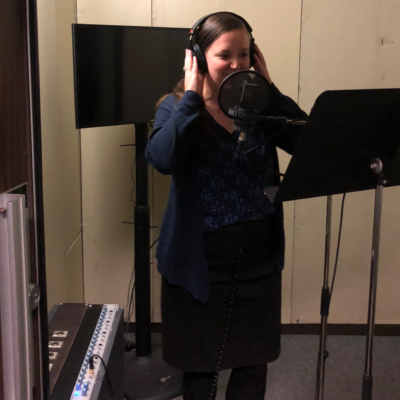| 00:09 |
ShortCuts Theme: |
[Piano Overlaid With Distorted Beat]
|
| 00:09 |
Hannah McGregor: |
Welcome to SpokenWeb ShortCuts. Each month on alternate fortnights (that’s every second week following the monthly SpokenWeb Podcast episode) join me, Hannah McGregor and our minisode host and curator, Katherine McLeod for SpokenWeb’s ShortCuts mini-series. We’ll share with you specially curated audio clips from deep in the SpokenWeb archives to ask: what does it mean to cut and splice digitally? What kinds of new stories and audio criticism can be produced through these short archival clips? An extension of the ShortCuts blog posts on Spoken Web blog, this series brings Katherine’s favourite audio clips each month to the SpokenWeb Podcast feed. So if you love what you hear, make sure to head over to SpokenWeb.ca for more. without further ado. [End Music: Piano Overlaid With Distorted Beat] Without further ado, here is Katherine McLeod with SpokenWeb ShortCuts, mini-stories about how literature sounds. [SpokenWeb Podcast Theme Music: Instrumental Overlapped with Feminine Voice]
|
| 01:17 |
Katherine McLeod: |
Welcome to SpokenWeb’s ShortCuts. In this ShortCuts, our listening will be inspired by the previous full episode of The SpokenWeb Podcast. That means we’ll be drawing our inspiration from Daphne Marlatt’s conversation with Karis Shearer and Megan Butchart in the recent episode “SoundBox Signals presents Performing the Archive.” They talk with Marlatt about poetry readings and about her performance with the archive in a poetry reading that had taken place the night before the interview — in 2019. In that reading, Marlatt had read alongside recordings of her past self — a recording from 1969.
|
| 02:02 |
Katherine McLeod: |
This ShortCuts is inspired by the question of what it feels like to hear a recording of your past self – and asks: how can an archive contain traces of what the self – the body – behind the voice was feeling? In the case of Marlatt, she is a poet who has graciously accepted the invitation by SpokenWeb to listen to recordings of her past self and past voice more than once. I was there in the audience at a previous one. That was a reading that Marlatt gave in 2014 in Montreal. She read along with a recording of her reading in Montreal in 1970. What strikes me in listening back to that 1970 recording after hearing Marlatt’s conversation with Shearer and Butchart on the podcast is the extent to which a recording captures a person in a moment in time in their body. I’m thinking here of the difference between what she thought her voice sounded like in that recording and what she could remember feeling. I had listened to that 1970 recording for a previous ShortCuts with my listening attuned to place — check the show notes for Then and Now — but this time I was listening to that 1970 recording with my attention attuned to where the body was present in this recording. I noticed how she introduces the poem “Bird of Passage.” What she says before reading “Bird of Passage” is quite short but it contains so much, both said and unsaid.
|
| 03:41 |
Katherine McLeod: |
She says, this is a poem that I wrote.
|
| 03:44 |
Audio recording, Daphne Marlatt, 1970: |
This is a poem that I wrote when I was about… oh I don’t know, seven or eight months pregnant… [Pause] …Bird of Passage. I wrote it in Vancouver… spring time again…. Bird of Passage.
|
| 04:03 |
Katherine McLeod: |
Here, was Marlatt in 1970 saying that she had written this poem ‘Bird of Passage’ while she was pregnant. That is significant in and of itself when thinking of the body but now I was hearing it with the full resonance of her recent conversation with Shearer and Buchart from the podcast and what Marlatt says when the date of the recording, July 1969, is mentioned…
|
| 04:30 |
Audio Recording, Daphne Marlatt, “SoundBox Signals presents Performing the Archive”, 2019: |
Interesting that date, because I had given birth to my son at the beginning of May. So, I was a young mother, my body had gone through a major experience. That was not the experience that I’d had when I wrote those poems. What was interesting to me hearing last night at the reading – there was so much – my voice was so much more present in those poems than I had remembered my voice being, and I think it’s because of the giving birth experience…
|
| 05:09 |
Katherine McLeod: |
Her comment is about a memory of how the body had felt when she was writing those poems. And her comment is also about how she remembers feeling in her body when she was reading those poems out loud. I wonder, then, how would it have felt to read “Bird of Passage” out loud to an audience in 1970. Only she will know that. The archive cannot answer that question. But what we can hear in the archive is the sound of the poem and how it resonates now in relation to Marlatt’s writing. Listen to the sound of passage vibrating in this poem, “Bird of Passage,” not only in the title but in phrases like this one:
|
| 05:56 |
Audio recording, Daphne Marlatt, 1970: |
[Reading “Bird of Passage”] “…eave swallows cliff, passerine, which I thought meant passing as passenger sails, through an isthmus, time does not constrict…”
|
| 06:05 |
Katherine McLeod: |
It is as though the poem is moving towards what passage comes to mean in Marlatt’s poems — passage, passing, a moving towards, language as the medium of passage, a passage between…
|
| 06:19 |
Audio recording, Daphne Marlatt, 1970: |
I cannot grasp your sound, breath, stone, you turn dumb, and will not speak, of what sticks at, feathers, uneasy nest, unease, a restlessness, tonight, drips in, passing in return, perhaps light airs, we begin again…
|
| 06:43 |
Katherine McLeod: |
That is how she ends the poem, and we’re about to listen to it from the beginning in its entirety together, but I’ve played these clips from it in advance to attune ourselves to the poem. It is a poem that one could pass over while listening to the reading, but her brief introductory words made it stand out especially because I was listening with the question of: how can we hear feelings of embodiment in the recording of this reading? Recently, in the afterward to Rivering, Marlatt has written this observation — quote: “Sometimes, unknowingly, one writes a few lines that continue to reverberate as some kind of pointer for future years of writing.” Here is Marlatt reading “Bird of Passage” in 1970. I invite you to hear the resonances of moving forward, the sound of her voice as passage, surging towards her future poems, her “future years of writing” …
|
| 07:50 |
Audio recording, Daphne Marlatt, 1970: |
This is a poem that I wrote when I was about – I don’t know –seven or eight months pregnant. “Bird of Passage” I wrote it in Vancouver, springtime again. Bird of Passage. [Reading poem, transcribed as heard – see Show Notes for a link to the poem as published.] Thaw begins tonight, Eaves drip incessant strain rings, wind bell spring brought forward out of time. This bird, dive bird, nestle, why stop nested under the eave of flesh or strong wet bird’s wings. Turned as I am against your anonymous hip, in sleep some cliff must be negotiated. Swallow. Eave swallows cliff passerine, which I thought meant passing as passenger sails through an isthmus, time does not constrict. Helpless, constriction in my throat seeing the picture of oil slick bird, will die. Fixed, its feathers mark coming out of yoke, this black stuff. Fix of its own birth. So a month’s accumulation of tears into icicles, vesicles, leaves, roots. Incessant release can be nothing more than alone, urine past, warm, squat by the window’s cold. Only to lie, quote, alone. Not ceasing its skim in serous medium light as air to us gravity-bound. Head over heels or wing bones supplied to test its limit extent, passage, passing, passenger. Temporary nest high in the air. Hirundinidae, hirondelle in graceful flight and regular migration. Fathered by a bird too sought definition for its passage, bird of sea, bird of passage or, quote, a rolling stone. Jumps in the womb for joy. A recognition, cognition, knowing whence sound came a rhythm per-vades rocking waves under the face of his, fight to be over the din. We are all born in risk, mute, cliff. I cannot grasp your sound, breath, stone. You turn dumb and will not speak of what sticks at feathering. An uneasy nest, unease, a restless. Tonight, drips in passing in return, perhaps light airs. We begin, again.
|
| 10:57 |
Katherine McLeod: |
[Start Music: ShortCuts Theme Song] ShortCuts is mixed and mastered by Judith Burr, hosted by Hannah McGregor, transcribed by Kelly Cubbon, and produced by me, Katherine McLeod. Check SpokenWeb.ca to find out more about the sounds of these recordings. Thank you for listening. [End Music: ShortCuts Theme Song] |

